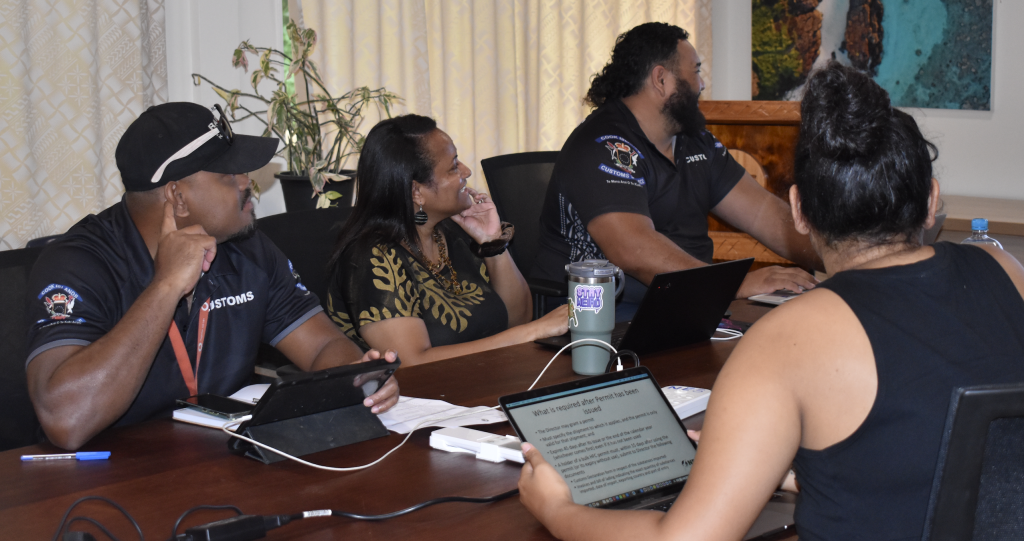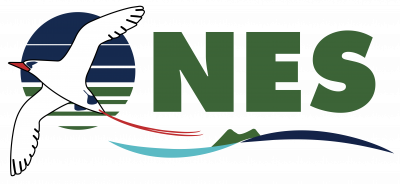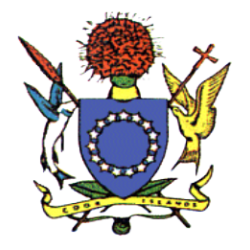Montreal Protocol Licensing System
A permit to import is required for controlled substances & alternatives listed under the Kigali Amendment to the Montreal Protocol.

MONTREAL PROTOCOL
The Cook Islands are a party to the Montreal Protocol on substances that deplete the ozone layer.
The Montreal Protocol is a multilateral environment agreement that regulates and controls the production, trade and consumption of nearly 100 man-made substances referred to as Ozone Depleting Substances (ODS).
The most common ODS substances used globally are; Chlorofluorocarbons (CFCs) and Hydrochlorofluorocarbons (HCFCs) which are found in cooling appliances – refrigeration,
air-conditioning, heat pumps and foams.
The Cook Islands have taken extra measures to prohibit the importation of CFCs and HCFC refrigerants and based-equipment under the Environment (Montreal Protocol) Regulations 2021.
Table 1: Multilateral Environmental Agreements related to Ozone Depleting Substances and Climate Change to which the Cook Islands is a Party
| Conventions/ Protocol/ Amendment | Adoption | Date of Ratification |
|---|---|---|
| Vienna Convention | 1985 | 22 December, 2003 |
| Montreal Protocol | 1987 | 22 December, 2003 |
| London Amendment | 1990 | 09 August, 2004 |
| Copenhagen Amendment | 1992 | 09 August, 2004 |
| Montreal Amendment | 1997 | 09 August, 2004 |
| Beijing Amendment | 1999 | 09 August, 2004 |
| Kigali Amendment | 2016 | 22 August, 2019 |
| United Nations Framework Convention on Climate Change | 1992 | 20 April 1993 |
| Kyoto Protocol to the UNFCCC | 1997 | 27 August, 2001 |
| Paris Agreement under the UNFCCC | 2015 | 01 September 2016 |
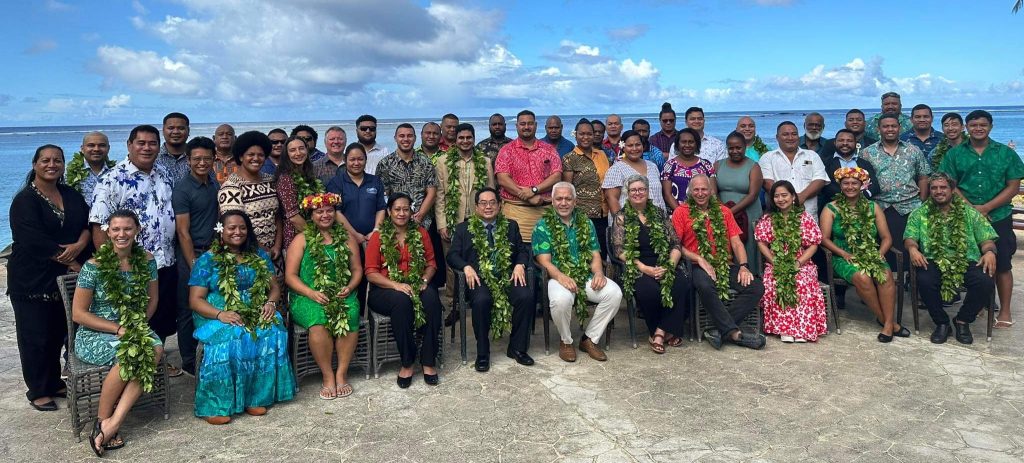
Kigali Amendment to the Montreal Protocol
The Cook Islands becomes the 81st country to formally ratify the Kigali Amendment, which was adopted by 197 countries
The Kigali Amendment of the Montreal Protocol is an international agreement aimed at phasing down the production and consumption of hydrofluorocarbons (HFCs) which are synthetic greenhouse gases used in various applications, including air conditioning and refrigeration.
HFCs are potent contributors to global warming when released into the atmosphere.
The Kigali Amendment, adopted in 2016, builds upon the original Montreal Protocol, which successfully phased out the production of ozone-depleting substances.
The Cook Islands have implemented a HFC Licensing Permit System to monitor the importation of HFCs, ensuring compliance with the HFC phase-down timeline.
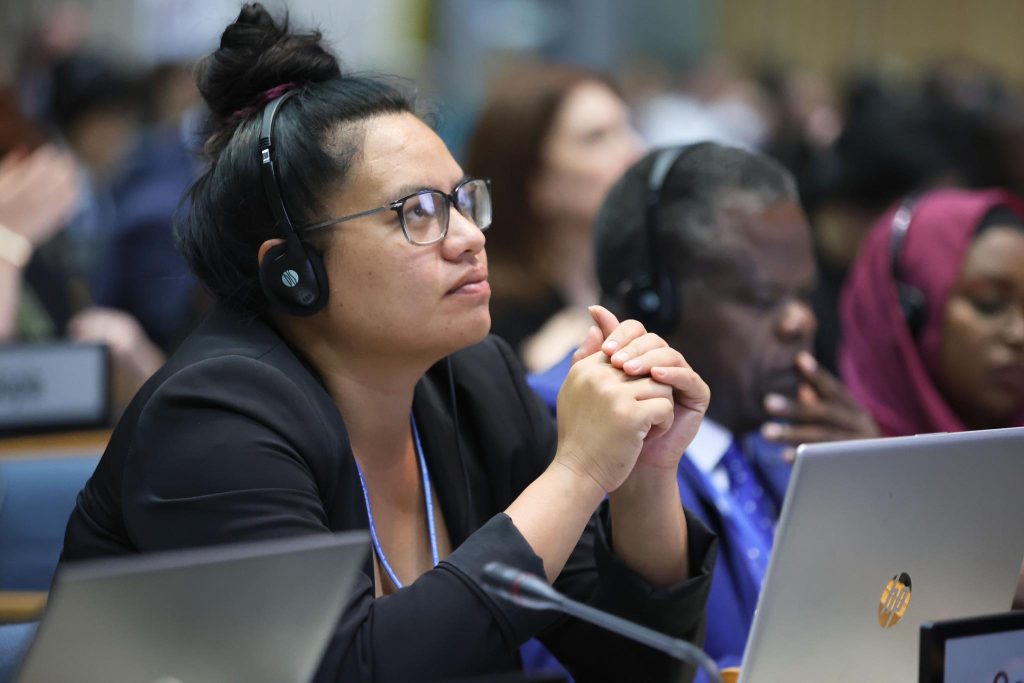
Kigali Amendment: HFC Quota Allocation
BASELINE & PHASE-DOWN:
The amendment sets a baseline for HFC production and consumption, with a phased reduction for each participating country. Quotas are based on historical data collected directly from importers of hydrochloroflurocarbon (HCFCs) and HFCs.
Table 1: Cook Islands HFC Phase down
Baseline Calculation (Tonnes Co2 eq)
- Average consumption of HFC's in 2020, 2021 & 2022
- Plus 65% of Hydrochorofluorocarbons (HCFCs) consumed in 2009 - 2010
| Step | Year | Reduction % from baseline |
|---|---|---|
| HFC Freeze | 2024 | |
| Step 1 | 2029 | 10% |
| Step 3 | 2040 | 50% |
| Step 4f | 2045 | 80% |
| HFC Consumption | Calculation |
|---|---|
| 2020 | 1,149 |
| 2021 | 6,648 |
| 2022 | 6,410 |
| Average | 4736 |
| Average HFC Consumption 2020, 2021 & 2022 | 65% of HCFC Baseline | Total |
|---|---|---|
| 4,736 | 1,049 | 5,785 |
| Detailed Quota Allocation | Tonnes Co2 eq |
|---|---|
| Obligations as per Kigali Amendment | 5,785 |
| The allocated HFC quota already distributed | 5,207 |
| Buffer for HFC for new importers (10%) | 579 |
Institutional Strengthening Project (ISP)
The NES receives ISP funding under the Montreal Protocol to operate an effective and well-organized National Ozone Unit (NOU) to support the country’s compliance with the control measure and other obligations under the Montreal Protocol, in order to assist with the implementation of activities under the Protocol.
Expected results/outputs to be achieved:
- Capacity of NOU and other national stakeholders will be strengthened to effectively implement the Montreal Protocol;
- Continuous collaboration to strengthen capacity building of refrigeration and enforcement officers under the HCFC Phase-out Management Plan (HPMP) and enabling activities implementation and update status report of the capacity building activities;
- Continuous enforcement of the Environment (Montreal Protocol) Regulations 2021 and preventing illegal trade of control and monitor import of ODS and alternative in order to meet and sustain compliance to the Montreal Protocol, and update progress on activities undertaken to enforce regulations.
| Status | Amount | Ending Dates |
|---|---|---|
| Active | $80,000 USD | 30 June 2024 |
Hydrochlorofluorocarbons (HCFC) Phase-out Management Plan (HPMP Stage II)
The HPMP funding under the Montreal Protocol for Pacific Island Countries (PIC) through Regional Approach including the Cook Islands and collaboration between United Nations Environment Program is used to implement the following activities:
- To provide technical assistance and guidance to the Government to implement the activities to phase out remaining consumption of HCFC in lie with the approved HPMP Stage II and its correspondence tranche implementation plan.
- To assist in maximizing national ownership and sustainability of the process and outcome of the HPMP Stage II implementation by the Government.
- Reduction on HCFC consumption achieved to enable the country to maintain its compliance with the maximum allowable consumption and Montreal Protocol obligations.
| Status | Amount | Ending dates |
|---|---|---|
| Active | $40,000 USD | 31 December 2024 |
Preparation of Kigali Hydrofluorocarbon Plan (KIP) Project
The objective of the Preparation KIP Project in the Cook Island is as follows,
- To conduct consultation meetings and the national workshops to discuss scope and methodology of the nation-wide survey, and to obtain feedback from the stakeholders related to data analysis and validation, national strategy and country’s action plan as well as the draft project proposal of Regional KIP.
- To carry out a nation-wide survey of HFC consumption in the manufacturing (if any) and refrigeration servicing sectors and conduct data analysis to understand the current use and to estimate future trend of HFCs consumption by substances and by sector as well as information of HFC related policies and country’s challenges in the phase-down of HFCs in relevant sectors based on lesson learned, challenges and experiences from HCFC Phase-out Management Plan (HPMP) implementation.
- To explore possibility and way forward to integrate the Regional KIP with the approved Regional HCFC Phase-out Management Plan (HPMP) Stage II.
The preparation of KIP will help assist with the development of the Stage I of KIP.
| Status | Amount | Ending dates |
|---|---|---|
| Active | $25,000 USD | 31 December 2024 |
Kigali Implementation Plan Stage 1:
The objective of the Stage I of the KIP is to assist the Cook Islands to meet the obligation to freeze HFC consumption by 1 January 2024 and to meet 10% reduction from the baseline level by 1 January 2019. Given the project lifespan of the Stage I of the KIP, it is essential to have comprehensive data collection to enable country to prepare the Stage I of the KIP that best suit the country context and need.
Potential non-investment activities under KIP, which might need to be adjusted in accordance with HFC phase-down funding guidelines, can include but not limited to
- Policy and regulations to support HFC phase-down to prevent the growth and to phase down HFCs in relevant application, when feasible with the country context
- Capacity building of customs officers and prevention of illegal trade of HFCs
- Capacity building of refrigeration and air-conditioning (RAC)/mobile air-conditioning (MAC) training centers and technicians on good servicing practices (GSPs) including safe handling of alternatives, such as updating curricula of the training programs of Technical and Vocational Education and Training (TVET) to address GSPs and safety issues related to the flammability and/or toxicity of refrigerants being phased in, training the trainers and technicians, provision of equipment, competency-based certification with integrated GSP of RAC/MAC technicians programs etc.
- Public awareness activities
- Technical assistance to address safety issues associated with alternatives with low and zero GWP for various applications and energy efficiency related matters, such as promoting efficient and sustainable cold chain, adopting safety and energy efficiency standards
- Any others in accordance with the HFC phase-down funding guidelines
| Status | Amount | Ending Dates |
|---|---|---|
| Implemented in 2025 | TBC | 31 December 2029 |
